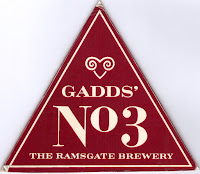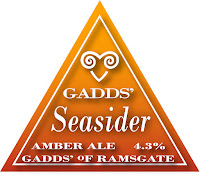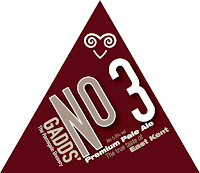Wednesday, 4 September 2024
Wednesday, 27 March 2024
Welcome to GADDS' 22nd Birthday Beer Festival!
Here's a short and sweet guide......
Tokens - in order to keep service as speedy as possible, all transactions are by tokens. Please buy these at the tokens station near the main entrance. Here you can pay by card or cash. Any unused tokens can be exchanged for cash or donated to this year's charity.
Glasses - get these with your tokens and please hang on to them! There are only just enough so if you lose yours, you may have to wait for your next pint.
Beers
From the iconic 175 year old Manchester Brewer, Joseph Holt, we have Mild, at 3.2%, and Bitter, at 4%. There's a special place in my heart for these beautifully brewed and deliciously drinkable beers.
T&R Theakston, brewers in Masham, Yorkshire, are even older, clocking up 200 years in the biz. From them we have the legendary dark ale, Old Peculier, at 5.6% and their 'Best' Bitter at 3.8%.
Tom's Tap and Brewhouse in Crewe is our next stop where old chum Sean brews an eclectic mix of cask ales. We've selected Dark Mild (3.8%) and Brit Hopped Pale Ale (4.1%).
Over to the West Country next for some cask ale of exceptional quality from Wye Valley Brewery: HPA (4%) and Wholesome Stout (4.6%). WVB are the standout success in cask brewing over the last 30 years, for very good reason!
And on to the Surrey Hills Brewery where we found former Supreme Champion Beer of Britain winner, Shere Drop (4.2%), and the strong and hoppy Collusion (5.2%).
It wouldn't be a GADDS' beer festival without our friends from Burning Sky in Sussex. We have a new one from them, NZPA (4.5%) - so new there isn't a link for it - and old favourite Aurora (5.6%).
Closer to home we have a couple of casks from that there London: our friends Sambrook's Brewery and their Wandle (3.8%) and Junction (4.5%). Quality cask ale from the smoke.
From GADDS' cask store we have many of the regular favourites and some experimental ales. Of particular note are: Blarney Stone Stout (4.3%) and She Sells Dry Hops (4.7%).
If that wasn't enough we have, on keg, Burning Sky Arise (4.4%), Utopian British Lager (4.7%), Sambrooks Pagoda Pilsner (4.5%), Utopian x GADDS' Green Hopped Pilsner (5%) and Sambrooks Block Party IPA (5.5%).
Then, once you worked your way through that lot you can take a vintage bottle or two from our cellar home: Westvleteren 12 - a super sought after trappist rarity, 2 year aged Orval, 10 year aged GADDS' Imperial Russian Stout, and 2021 vintage GADDS' Chairman of the Board.
The festival runs from midday on Good Friday until 5pm that evening, and we go again midday Easter Saturday, until 5pm. Some of the beers may run out before you get here, but we will be holding some specials back for Saturday, and we'll be brewing on the pilot plant too, ensuring both days are quality days.
Friday March 29th, midday - 5pm
Saturday March 30th, midday - 5pm
Monday, 10 April 2023
Friday, 31 March 2023
Earth Day IPA
1. Walking/cycling/busing to work. An easy win: leaving the car
at home for short journeys is a no-brainer, so that’s what we did.
2. Breadcrumbs: the guys at TOAST are pioneering the use of
waste bread (there’s an eyewatering amount, daily) in brewing. We replaced 5%
of our high footprint malted barley with negative footprint waste bread crumb.
3. Raw barley: the
malting process adds footprint to barley, so we replaced a further 5% of our
malted barley with raw barley. We can’t replace it all, because a) we need
enzymes from the malt, so it wouldn’t work, and b) even if it did work, it
wouldn’t taste like anything resembling a modern cask pale ale (ie, the brief).
4. Super Pale Malt: after barley is germinated by the maltster
it needs to be dried in an oven, where it picks up a bit of colour. Super pale
malt isn’t dried as much, using less energy in the process, and making our beer
super pale!
5. Reduced boil time: this would have been a great idea, but we
realised it wouldn’t produce a clear pint, and we couldn’t find a way round
that in our brewery. We could make a cloudy beer this way, but that wasn’t in
the brief either. So we binned the idea for now and will spend sometime
pondering it. It would reduce our energy requirements significantly.
6. High gravity brewing: here the idea is to brew our sugary
wort a bit stronger (5%), and water it down a little after the boil, saving on
the energy used for boiling. This is relatively common practice and A Good Idea
(but don’t take it too far, or the beer will be rubbish – Ed).
7. Using locally grown hops: hops grown within 30 miles, and
delivered in bulk once a year, direct from the farm, have the edge over those
shipped from afar in small amounts. This is common practice at GADDS where we
use a lot of the fabulous East Kent Golding variety, grown up the road.
8. Using new UK hop varieties: ‘modern’ cask pale ale suggest
some big, punchy flavours often found in hops grown in the USA, New Zealand or
Australia. However, the UK hop industry, known primarily for its exquisitely
balanced, classically understated hops, is fighting back, breeding some
exciting new varieties full of intensity. We used Harlequin (passion fruit and
peach) and Jester (grapefruit and tropical fruit) to flavour our IPA, and they
were grown right here in the UK.
9. Solar: in brewing we control fermentation temperatures using
electricity hungry chilling machines, and the stronger the sunshine and the
warmer it gets, the more the machines work and use energy. Luckily for us, this
suits solar panels perfectly as they work best when that sun is out. At GADDS’,
on a reasonable day, all our electricity is provided by the solar array on the
roof.
10. Carbon dioxide capture: all alcoholic fermentation produces
CO2 at a rate of about 1 gram per gram of alcohol, so fermenting
your evening litre of ale releases about 35 to 40 grammes into the atmosphere.
But, this CO2 was absorbed from the atmosphere by the growing
barley, so it’s classed as ‘biogenic’ and doesn’t increase your carbon
footprint. That said, capturing the CO2 from fermentation is a super
way of removing it from the atmosphere, so that’s what we do at GADDS’. Once
it’s cleaned, purified and condensed into liquid in a mobile storage tank we
take it over to the local bottling company, to be put back into beer.
11. Enzymatic cleaning: as every thoroughly modern householder
knows, enzymes are the boss of cleaning these days, and they’re moving into the
brewing industry. They’re very good at breaking proteins and starches down, and
they’re environmentally friendly. Historically we brewers have used caustic
soda at high temperatures – it’s quite a nasty chemical, with a high footprint,
and we’re very glad to be seeing the back of it. All casks of Earth Day IPA
will be cleaned with enzymes, as will the fermentation vessel.
12. Vegan finings: for the last hundred years or so brewers and
wine makers have clarified their drinks using a protein derived, typically,
from fish. We don’t know what the footprint of the fish is, but we do know
they’d prefer to be left unmolested, so we’ve found an alternative method to
drop the yeast out making Earth Day IPA vegan friendly.
13. For good measure, and to make up for not reducing our boil
time (see 5), all Earth Day IPA will be sold in casks for consumption in the
pub. This avoids single use packaging, stores the beer at 12°C
in the pub (instead of 6°C in your fridge) and gets you all into your local
hostelry, so you can switch the central heating off! Win:win.
We’re not claiming this beer will save Earth, but it was a lot of fun and allows us to open discussions on how we can all help to make a difference. Ours is the most ancient of industries, steeped in history and carried out using artisanal methods bestowed on us by previous generations. But that doesn’t mean we can’t change, and adapt, whilst retaining the fundamental way we make beer, and the consequent fabulous pint. So, whilst you sup on a pint or two of Earth Day IPA, raise a glass and TOAST everyone determined to make a difference.
Here’s to change!
Cheers.
PS Look out for Earth Day IPA in all the usual local East
Kent hostelries of choice from around the 14th of April. Or come to our tasting, tickets here.
Friday, 10 March 2023
GADDS' comes of age
Bakers (The Belgian Bar, for short). 21 years of ups and downs and changes and no changes, and we’ll all have time to reflect and recount on all things GADDS’, Kent, brewing, and beer over a few pints of iconic cask ale at the Brewery’s 21st Birthday Cask Beer Festival, at the GADDS’ Taproom, this Good Friday and Easter Saturday.
Of course, timing is everything and the worldwide craft beer movement (taking encouragement from Thanet CAMRA, no doubt) got underway. New breweries were springing up all over the place and the number in Kent began to rise from the 9 it had been stuck on for a few years (OK, name all 9?). Change was afoot for GADDS’ too, as we moved operations from the Belgian Bar to our new home up at Hornet Close, and focused on producing cask ale for the pubs and people of East Kent. But whilst the number of Kent breweries was rising, the number of handpumps available wasn’t (yet) and sales were flat, at that just-about-enough level. In the ‘old days’ we’d always get a decent mid-summer boost from the Canterbury branch of CAMRA, and their Kent Beer Festival, who could be relied upon to buy up to 10 kilderkins from each of the Kent breweries, equating to a 25% uplift in sales in a week for us at GADDS’. As the number of new brewery openings accelerated, this much appreciated bonus diminished, and we went off to music festivals, where cool, local cask ale found favour in an otherwise sea of short poured Heineken.
A couple of years after the big move to Hornet Close, a combination of a localism movement, the ongoing annual success of the Planet Thanet Easter Beer Festival, an emerging craft beer revolution, and a rise in the number of Kent breweries, produced a growing interest in (and demand for) local beer that finally began to take effect, and our phone started to ring. Local publicans were at last open to the idea that cask ale might just work for them. Sales rose strongly and we rebuilt the brewery, purchasing Dark Star’s old kit and tripling capacity. By this time we had long had our core beer range of Numbers 3, 5 and 7, alongside Seasider and Dogbolter, and we organised our specials into an annual seasonal range, adding such beers as She Sells Seashells, Rye Pale Ale and Summer’s Day.
It was in September 2009 that, taking inspiration from a visiting brewer from Falling Rock in California, we tentatively brewed our first batch of Green Hop Ale, not really knowing what we were doing, how it would turn out or what might happen next. The brewing gods smiled upon our efforts and the rest is history. The popularity of Green Hop Ale far exceeded anything anyone expected and continues to grow year by year, so much so that today we brew nothing else during harvest. Sadly in 2020, following a global collapse in demand for hops due to a big fall in beer consumption during lockdowns (I know, the headlines would have you believe we were all pickling ourselves in booze, but the truth is that the drop in hospitality drinking far exceeded the rise in home tippling), our much loved local farmer, Humphrey Hulme, was forced to quit his lifelong love of growing East Kent Goldings hops, and focus on his core fruit business. We’d used Humphrey’s EKGs in most of our beers for 18 years, and they had become the very lifeblood running through the brewery. These kind of blows can knock a business sideways, but this one turned out to be not so bad afterall – we moved our hop contracts over to the fabulous growers on Syndale Farm, John Clinch and his daughter Anna, who have produced, in the last two years, the most amazingly good EKGs this author has seen in 30 years.
Today, in 2023, in a post-pandemic world, with certain parts of the country (principally London) reporting plummeting cask ale sales, and brewers all over the UK moving into keg, you’d be forgiven for thinking that the future looks bleak for both GADDS’ and for CAMRA. Quite the opposite, in my mind – cask ale is the fastest, freshest way of producing beer, with the very least amount of processing, and, delivered to (and drunk in) a local pub it has the smallest carbon footprint of all the beers. It’s also extremely delicious, and these attributes will ensure cask ale will survive, and flourish, long into the future. And where there is cask, there is a local CAMRA branch.
Friday, 2 December 2022
Cracker Time!
Friday, 18 November 2022
Green Hop Pilsner - a Utopian Collaboration
Utopian: "modelled on, or aiming for, a state in which everything is perfect; idealistic."
Collaboration: "the action of working with someone, to produce something."
Also Utopian: "a fabulous craft brewery in Devon, specialising in perfecting the art of lager brewing with British ingredients."
Also collaboration: "the whole should be greater than the sum of the parts."
For a number of years we've harboured the desire to create a delicious pilsner using freshly picked, undried, 'green' hops (East Kent Goldings, to be specific) - crisp and clean, with an elegant, floral, green hop aroma. So when the good people at Utopian Brewing suggested a collaboration, we jumped at the chance.
It's finally ready, and you can order it here, in time for the official launch on Wednesday 23rd at both the Ravensgate Arms in Ramsgate, and at Topsham Brewery and Taproom, in Exeter, if you're down that way. Read on if you're interested in how it was brewed.
One of the secrets, the main secret in fact, to brewing great pilsner is in the fermentation - to secure the 'clean' part of the specification, this must be conducted at distinctly chilly temperatures of around 10°C, slowing the yeast down to a relative crawling pace. Now, our own yeast wouldn't get out of bed for anything cooler than 14°C but, luckily for us, the Utopian strain, no doubt (nefariously) first obtained from a centuries old Bavarian craft brewery in a hollowed out walking stick (or such), is a master of the colder arts. These ninja strains possess a princess and the pea characteristic, and must be protected from the real world at all costs - basically, if it isn't at just the right temperature, in just the right fermenting beer, in just the right shaped fermenting vessel, it has to be undisturbed, and close to freezing, in the dark confines of a medieval cellar below Munich. For this reason, very early on the morning of our brewday, the yeast was rushed up from Devon, packed in ice in the back of a brewers' campervan/yeast ambulance, compassionately cared for by the very highly qualified, German trained, Utopian Brew Master. This set the tone for our collaboration.
Syndale Farm near Faversham, towards the end of harvest, was the early morning meeting venue. Farming father and daughter, John and Anna Clinch, grow the very finest East Kent Golding hops in the world here - the 'brick earth' land blessed with cool, springtime, on-shore breezes and warm, sunny, mid-summer sunshine that this hop variety loves. Walking this land is essential to set the tone for green-hop-brewing, followed by hop chat with pickers and, finally, collecting a van full of freshly picked, green, and aromatic hop cones. It was a tough harvest this year, the bines coming under a lot of water stress due to drought conditions. This isn't good for the farmers as the crop is consequently short, but it's great for brewers and drinkers as the hop flavour and aroma tends to improve. These are the best EKG this author has seen in 30 years.
Once back at the brewery we made beer, mashing UK grown 'Czech' pilsner malt and loading our hop stash very late in the boil, before pitching the sleepy, unsuspecting Utopian yeast.
German trained brewers behaving strangely
Fermentation was cool, and slow; if it's a super clean brew you're looking for, you need to be patient. Once all the sugars have been used up, the temperature is dropped slowly, and daily, to get below zero without upsetting the pernickety yeast (most off-flavours in beer are due to brewers upsetting pernickety yeast).
After 2 weeks of fermentation, and 6 weeks of cold lagering, the Green Hop Pilsner was canned, and kegged, unfiltered. And here we are - it's in warehouse, and ready to ship on Monday.
We do our own thing at GADDS', and rarely collaborate, but we do strive for Utopia, and when we find it, this beer will be on tap.
Get some here, and use the code "sawitontheblog" for a 5% discount (a reward for reading all this way down the page, thanks).

.png)






.jpg)



